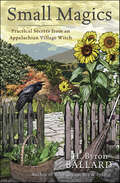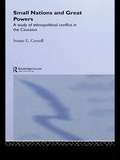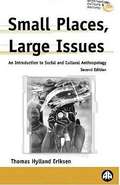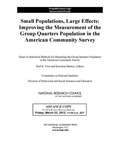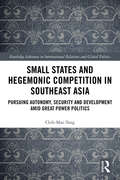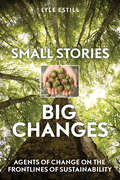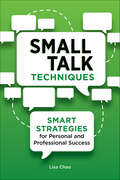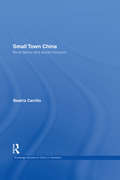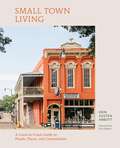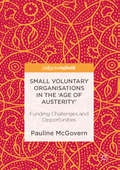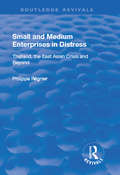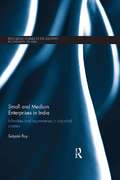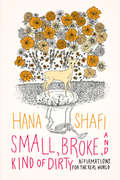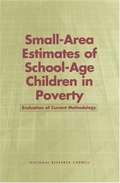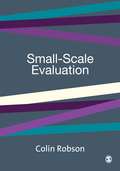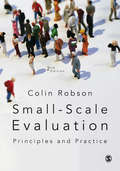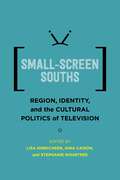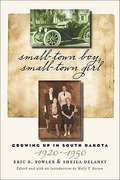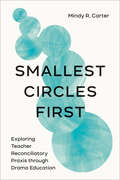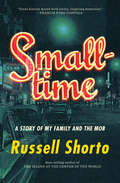- Table View
- List View
Small Magics: Practical Secrets from an Appalachian Village Witch
by H. Byron BallardYour hands-on, back-to-basics guide to building a magical practice.“Common-sense folk wisdom, remedies, and practices . . . and a welcome perspective that the magical world all around is not only accessible to us, it is part of us.” —Miles Batty, author of Teaching Witchcraft As if you’re having face-to-face lessons on her porch, H. Byron Ballard introduces you to the ways of magic, answering vital questions about what it is, why it matters, and how to do it. She teaches the mechanics and foundational skills of practice, offering no-nonsense techniques that practitioners of any skill level or tradition can use.Drawing from her many years as a practicing witch, Ballard demonstrates how to engage daily with the energy around you. She encourages you to experience magic with fresh eyes—whether you're a beginner or need to regain a beginner’s mind. This book provides grounding exercises, shielding methods, healing magic, insight on witchcraft tools, and more. Ballard offers everything you need to live a full, enchanted life in our deliciously magical world.“A down to earth, easy to read instruction manual filled with practical magical solutions all of which can be performed with items you already have on hand.” —Dorothy Morrison, author of Everyday Magic
Small Nations and Great Powers: A Study of Ethnopolitical Conflict in the Caucasus (Caucasus World)
by Svante CornellIntroduces the geographical, historical and ethno-linguistic framework of the Caucasus, focusing on the Russian incorporation of the region, the root most conflicts; analyses individual conflicts, from their origins to the attempts at resolving them; analyses the role of the three regional powers (Turkey, Iran and Russia); and sets out a synthesis of the Caucasian conflicts and a conclusion on the place of the Caucasus in world affairs.
Small Places, Large Issues: An Introduction to Social and Cultural Anthropology (2nd edition)
by Thomas Hylland EriksenThis is a new edition of an introductory anthropology textbook for undergraduates. Eriksen (social anthropology, U. of Oslo) focuses on such central topics as kinship, ethnicity, ritual, and political systems, and offers examples that demonstrate the scope of anthropology and the basic approaches of the discipline. Annotation c. Book News, Inc., Portland, OR (booknews.com)
Small Populations, Large Effects
by Panel on Statistical Methods for Measuring the Group Quarters Population in the American Community SurveyIn the early 1990s, the Census Bureau proposed a program of continuous measurement as a possible alternative to the gathering of detailed social, economic, and housing data from a sample of the U. S. population as part of the decennial census. The American Community Survey (ACS) became a reality in 2005, and has included group quarters (GQ)-such places as correctional facilities for adults, student housing, nursing facilities, inpatient hospice facilities, and military barracks-since 2006, primarily to more closely replicate the design and data products of the census long-form sample. The decision to include group quarters in the ACS enables the Census Bureau to provide a comprehensive benchmark of the total U. S. population (not just those living in households). However, the fact that the ACS must rely on a sample of what is a small and very diverse population, combined with limited funding available for survey operations, makes the ACS GQ sampling, data collection, weighting, and estimation procedures more complex and the estimates more susceptible to problems stemming from these limitations. The concerns are magnified in small areas, particularly in terms of detrimental effects on the total population estimates produced for small areas. Small Populations, Large Effects provides an in-depth review of the statistical methodology for measuring the GQ population in the ACS. This report addresses difficulties associated with measuring the GQ population and the rationale for including GQs in the ACS. Considering user needs for ACS data and of operational feasibility and compatibility with the treatment of the household population in the ACS, the report recommends alternatives to the survey design and other methodological features that can make the ACS more useful for users of small-area data.
Small Sacrifices: A True Story Of Passion And Murder
by Ann RuleA true story about Diane Downs who shot her 3 children in cold blood.
Small States and Hegemonic Competition in Southeast Asia: Pursuing Autonomy, Security and Development amid Great Power Politics (Routledge Advances in International Relations and Global Politics)
by Chih-Mao TangIn the last few decades, Southeast Asia has become generally more peaceful and more prosperous, with progress in economic development, regional cooperation and integration. ASEAN in particular plays a leading role within and beyond the region in promoting multilateral cooperation in both security and economic matters. All these developments progress amid increasing hegemonic competition between the US and China for regional dominance in the Asia-Pacific region. According to the realist viewpoint of international politics, Southeast Asian states can do nothing but choose sides at the expense of international political autonomy in order to maintain their national interests. Tang argues, however, that in fact there exists an opportunity for Southeast Asian states to simultaneously reinforce their military security, economic development and international political autonomy in face of the US-China hegemonic competition. Drawing on the ideas of power transition theory and recent works of capitalist peace, Tang argues that small states can exploit the competition between great powers to make economic gains and ensure security while maintaining their autonomy. He outlines the necessity of cooperation among these small states and of economic liberalization for the effectiveness of this reinforcing dynamics, applying policy and econometric analyses to a wide range of qualitative and quantitative data.
Small Stories, Big Changes: Agents of Change on the Frontlines of Sustainability
by David W. Orr Lyle EstillA remarkable cast of characters inhabit the pages of this book. Meet Tim Toben, who developed a high rise with the lowest energy consumption of any building in the southeastern United States, was foreclosed upon, and lost millions in the process. Gary Phillips held the line against real estate developers in Chatham County and was run out of office for his efforts. Elaine Chiosso has been protecting her watershed by fighting on behalf of the Haw River for twenty-eight years.Unflinchingly honest and compulsively readable, Small Stories, Big Changes provides an intimate look at the personal experience of being a pioneer in the sustainability movement, laying bare the emotional, spiritual, and financial impact of a life lived in the service of change. Activist, farmer, publisher, philosopher or entrepreneur; each writer has a unique personal tale to tell.Small Stories, Big Changes is a book written by ordinary people doing extraordinary things; whose lives have been transformed by their willingness to commit themselves unreservedly to the creation of a better world. Empowering, hopeful, and inspiring, this rich tapestry of voices from the vanguard of change is a must-read for anyone dreaming of a brighter future and seeking a counterbalance to a canon of work that is laced with doom and gloom.Lyle Estill is the president and co-founder of Piedmont Biofuels and the author of Industrial Evolution, Small is Possible, and Biodiesel Power. He has won numerous awards for his commitment to sustainability, outreach, community development, and leadership.
Small Talk Techniques: Smart Strategies for Personal and Professional Success
by Lisa Green ChauSimple strategies for turning small talk into an essential tool for successThe ability to engage in effective small talk is an invaluable skill for any social interaction, from casual to professional. Small Talk Techniques is your ultimate guide to becoming a pleasantries pro, with practical strategies that help you establish genuine connections and leave people with a positive, lasting impression.This book is a straightforward resource featuring clear examples and explanations for how these techniques work. You'll also find a range of simple ways to start, maintain, and exit conversations gracefully, listen actively, and keep others interested and engaged.Small Talk Techniques will help you:Navigate any conversation—Learn about the essential components of small talk like asking open-ended questions, expanding on small details, matching someone's mood, and even recovering from social missteps.Expand your network—This expert advice helps you prepare yourself for conversations ahead of time, as well as giving you the tools to make new connections on the fly, and adapt to changing social dynamics with ease.Get the truth about small talk—Break down why small talk is so important and how it opens the door for trust, credibility, and future success at work and in life.Explore how far small talk can take you, with simple strategies and examples that make it easy.
Small Town China: Rural Labour and Social Inclusion (Routledge Studies on China in Transition)
by Beatriz Carrillo GarciaWhile much has been written about rural migrant workers’ experiences in the big cities, population movements into China’s vast network of towns and small cities has been largely neglected. This book presents a detailed case study of rural migrant workers experiences in a small town in a north China county. The author explores the processes and institutions that enable or preclude the social inclusion of rural workers into the town’s socio-economic system. Inclusion and exclusion are assessed through an examination of rural workers’ immersion into the urban labour market, their access to welfare benefits and to social services, such as housing, education and health. The book proposes that outside the larger cities there are alternative accounts of urban social change and of the integration of rural migrant workers. It stresses the fact that the particular socio-economic structure of towns, where the state-owned share of the economy has been smaller and where consequently social and private forces have been more active, allowed for a more open inclusion of rural workers. Though shortcomings are still observed, the book suggests that China's transformation may not necessarily result in dysfunctional and socially polarized urban environments. This book will be of interest to students and scholars of China’s rural migrant workers, bottom-up urbanization and small town development, social policy, and more broadly on contemporary social change in China.
Small Town Living: A Coast-to-Coast Guide to People, Places, and Communities
by Erin Austen AbbottCelebrate the joys of small town life in this stunning, coast-to-coast photographic ode to country stores, main streets, and the inspiring creatives who have embraced life outside the city center. "An idyllic celebration of the rural life." —Publishers Weekly Big changes are taking place in how we live—and what we look for in the place we call home. From remote work options to the pull of wide open spaces and simpler lives, families, couples, and singles alike are looking away from major metropolitan areas and towards small towns. But where to go? How? When? There&’s a lot to consider when you&’re thinking about making the move to a small town—or just daydreaming about doing so. With the wisdom of an author who has made the move herself, Small Town Living answers these key questions in this sweeping, lushly photographed celebration of living small. Author and photographer Erin Austen Abbott has traversed the country to find creatives—from aquaculture preservationists to visual artists to entrepreneurs—who have opted for cozy towns over metropolitan bustle. In illuminating interviews and atmospheric photographs Austen Abbott showcases nearly two dozen couples and individuals who have embraced small town life, from the wilds of rural Maine, to the plains of Texas, villages of the Hudson Valley, and breathtaking seascapes of the Pacific Northwest. Woven throughout these regional chapters (East, Midwest, South, and West) are tips and sidebars to help readers begin their own small town journeys—from determining what's really important to you (like proximity to a university or access to hiking trails) to sensitively integrating into the community. A rich appendix showcases dozens of small towns grouped by themes like Small Museums, LGBTQIA+ Friendly, Film Festivals, as well as a list of small towns by state to inspire wanderlust.
Small Voluntary Organisations in the 'Age of Austerity'
by Pauline McgovernThis book analyses the dynamics that underlie the awarding of public funding to small voluntary organisations in the UK. Using Bourdieu's later work on state power, the author argues that these competitions for grants, loans and contracts are neoliberal funding 'games'. Such games tempt grassroots organisations, she demonstrates, not just because they provide funding but because they confer a symbolic profit by defining the 'winner' and improving status. Taking part in these neoliberal funding games, however, can adversely affect the structure and development path of these organisations. Yet her conclusion is upbeat, focusing on the opportunities as well as the challenges that neoliberalism offers grassroots organisations in recompense for the moral weight that they hold within state discourse. Within supportive coalitions and with a robust evidence base that re-politicises neoliberal orthodoxy, in fact, they can choose to negotiate alternative futures within state policy or to withdraw from these funding games altogether. This thought-provoking work will appeal to students and researchers of sociology and social policy, along with scholars of Bourdieu, civil society and the voluntary sector.
Small and Medium Enterprises in Distress: Thailand, the East Asian Crisis and Beyond
by Philippe RegnierThis title was first published in 2000: Since 1998, there have been many diagnoses, studies and theories attempting to explain the East Asian economic crisis and the impact on major economic and financial sectors. This text aims to fill a gap in the literature by examining the effects on small and medium-sized enterprises. From early 1998, unemployment figures in the region rose rapidly although large enterprises were not as yet engaged in corporate restructuring. Registered small and medium-sized enterprises (SMEs) and microenterprises were a major source of this unemployment, especially among unskilled and seasonal workers. This volume covers the debate in five ways. An introductory chapter presents an overview of the SME international experience both in OECD and developing economies. Part I looks at the economic and social contribution of SMEs in Thailand before and after the 1997-1998 crisis and Part II reviews government policy and SME promotion initiatives. Part III explores the assumption that local SMEs linked to large firms have been more resilient, while the concluding chapter suggests a range of policies which have been derived from experiences in places other than Thailand.
Small and Medium Enterprises in India: Infirmities and Asymmetries in Industrial Clusters (Routledge Studies in the Growth Economies of Asia)
by Satyaki RoySmall and medium enterprises (SME) have attracted increasing interest in the last few years, and industrialization is no longer seen as a linear way of development. This book analyzes how SME clusters emerge in a developing economy. Using India as a case study, it addresses one central question: If growth has largely failed to be inclusive so far, and if employing a work force in increasing returns activities through a different trajectory of industrialization is largely dependent upon industrial clusters of small and medium sized firms, then what are the structural infirmities and asymmetries that need to be taken into account in the context of framing policies related to industrial clusters? The book identifies the structural infirmities in industrial clusters in India, which could be typical to any of the developing countries and sharply in contrast to European success stories. Blending theory and empirical material, it provides a middle ground between the two extremes of a uniform policy assuming ‘one size fits all’, and a specific policy based on individual cases. The book redraws the broad contours where space and production processes mutually constitute each other, giving rise to outcomes somewhat generic to underdevelopment. It is of interest to academics working in the fields of economics, business administration/ management and development economics.
Small, Broke, and Kind of Dirty: Affirmations for the Real World (Solon Series #3)
by Hana ShafiLet's get one thing straight: Small, Broke, and Kind of Dirty: Affirmations for the Real World is not a book of advice. You're not going to find a step-by-step guide to meditation here, or even reminders to drink lots of water and get enough sleep. Those things are all good for you, but that's not what Hana Shafi wants to talk about.Instead, Small, Broke, and Kind of Dirty—built around art from Shafi's popular online affirmation series—focuses on our common and never-ending journey of self-discovery. It explores the ways in which the world can all too often wear us down, and reminds us to remember our worth, even when it's hard to do so. Drawing on her experience as a millennial woman of colour, and writing with humour and a healthy dose of irreverence, Shafi delves into body politics and pop culture, racism and feminism, friendship, and allyship. Through it all, she remains positive without being saccharine, and hopeful without being naive.So no, this is not an advice book: it's a call to action, one that asks us to remember that we are valid as we are—flaws and all—and to not let the bastards grind us down.
Small- And Medium-scale Industries In The Asean Countries: Agents Or Victims Of Economic Development?
by Ulrich Hiemenz Mathias BruchSmall- and Medium-Scale Industries in the ASEAN Countries is a comparative study of SMIs in the five member countries of the Association of Southeast Asian Nations (ASEAN), analyzing the performance of SMIs to generate income and employment.
Small-Area Estimates of School-Age Children in Poverty: Evaluation of Current Methodology
by National Research CouncilA report on Small-Area Estimates of School-Age Children in Poverty
Small-Scale Evaluation in Health: A Practical Guide
by Lesley J Griffiths Sinead Brophy Dr Helen SnooksSetting out the basics of designing, conducting and analysing an evaluation study in healthcare, the authors take a practical approach, assuming no previous knowledge or experience of evaluation. All the basics are covered, including: - How to plan an evaluation - Research governance and ethics - Understanding data - Interpreting findings - Writing a report Cases included throughout to demonstrate evaluation in action, and self learning courses give the reader an opportunity to develop their skills further in the methods and analysis involved in evaluation.
Small-Scale Evaluation: Principles and Practice
by Professor Colin RobsonHow can evaluation be used most effectively, and what are the strengths and weaknesses of the various methods? Colin Robson provides guidance in a clear and uncluttered way. The issue of collaboration is examined step-by-step; stakeholder models are compared with techniques such as participatory evaluation and practitioner-centred action research; ethical and political considerations are placed in context; and the best ways of communicating findings are discussed. Each chapter is illustrated with helpful exercises to show the practical application of the issues covered, making this an invaluable introduction for anyone new to evaluation.
Small-Scale Evaluation: Principles and Practice
by Professor Colin RobsonEvaluation research can assess the value and effectiveness of interventions and innovations involving people. While this has often been on a grand scale, this book focuses on small-scale projects carried out by an individual or small group, typically lasting for weeks or at most a few months, at a local rather than national level. Using limited jargon and featuring integrated, real-world examples, this second edition offers a clear, accessible background to evaluation and prepares you to undertake your own small-scale evaluation research project. Key features include discussion of: Different approaches to evaluation and how to choose between them The advantages and disadvantages of randomized controlled trials (RCTs) Realist evaluation and its increasing importance The centrality of ethical and political issues The influence and opportunity of the Internet Tightly focused on the realities of carrying out small-scale evaluation, Small-Scale Evaluation is a highly practical guide covering the needs of both social scientists and others without this background. Colin Robson is an Emeritus Professor in the School of Human & Health Sciences at the University of Huddersfield.
Small-Scale Evaluation: Principles and Practice
by Professor Colin RobsonEvaluation research can assess the value and effectiveness of interventions and innovations involving people. While this has often been on a grand scale, this book focuses on small-scale projects carried out by an individual or small group, typically lasting for weeks or at most a few months, at a local rather than national level. Using limited jargon and featuring integrated, real-world examples, this second edition offers a clear, accessible background to evaluation and prepares you to undertake your own small-scale evaluation research project. Key features include discussion of: Different approaches to evaluation and how to choose between them The advantages and disadvantages of randomized controlled trials (RCTs) Realist evaluation and its increasing importance The centrality of ethical and political issues The influence and opportunity of the Internet Tightly focused on the realities of carrying out small-scale evaluation, Small-Scale Evaluation is a highly practical guide covering the needs of both social scientists and others without this background. Colin Robson is an Emeritus Professor in the School of Human & Health Sciences at the University of Huddersfield.
Small-Screen Souths: Region, Identity, and the Cultural Politics of Television (Southern Literary Studies)
by Lisa Hinrichsen Gina Caison Stephanie RountreeAs the first collection dedicated to the relationship between television and the U.S. South, Small-Screen Souths addresses the growing interest in how mass culture represents the region and influences popular perceptions of it. In sixteen essays divided into three thematic sections, scholars of southern culture analyze representations of the South in a variety of television shows spanning the history of the medium, from classic network programs such as The Andy Griffith Show and Designing Women to some of today’s popular franchises like Duck Dynasty and The Walking Dead.The first section, “Politics and Identity in the Televisual South,” focuses on how television constructs understandings of race, gender, sexuality, and class, often adapting to changing configurations of community and identity. The next section, “Caricatures, Commodities, and Catharsis in the Rural South,” examines the tension between depictions of southern rural communities and assumptions about abject whiteness, particularly conceptions of poverty and profitized culture. The concluding section, “(Dis)Locating the South,” considers the influence of postcolonialism, globalization, and cosmopolitanism in understanding television featuring the region. Throughout, the essays investigate the profuse, often contradictory ways that the U.S. South has been represented on television, seeking to expand and pluralize myopic perspectives of the region.By analyzing depictions of the South from the classical network era to the contemporary post-broadcast age, Small-Screen Souths offers a broad historical scope and a multiplicity of theoretical and interdisciplinary perspectives on what it means to see the South from the television screen.
Small-Town Russia: Postcommunist Livelihoods and Identities: A Portrait of the Intelligentsia in Achit, Bednodemyanovsk and Zubtsov, 1999-2000 (BASEES/Routledge Series on Russian and East European Studies #Vol. 12)
by Anne WhiteThis book examines a number of key questions about social change in contemporary Russia - issues such as how people survive when they are not paid for months on end, 'the New Poor', the falling birth rate, why so many Russian men die in middle age, whether regional identities are becoming stronger, and how people's sense of 'Russianness' has developed since the creation of the Russian Federation in 1992. It examines these issues by looking at actual experiences in three small Russian towns. It includes a great deal of original ethnographic research, and, by looking at real places overall, provides a good sense of how different aspects of social change are interlinked, and how they actually affect real people's lives.
Small-town Boy, Small-town Girl: Growing Up in South Dakota, 1920-1950
by Eric B. Fowler Sheila Delaney Molly Patrick Rozum(front flap) Dissimilar in size and separated by more than two hundred miles, the two towns have more in common than might appear at first glance. Elsewhere in the country, they would be considered small towns, but in South Dakota, they are urban population centers. In the first half of the twentieth century, when many more South Dakotans lived on farms and ranches than do today, towns such as Milbank and Mitchell formed hubs for commerce, social activities, and culture. Eric Fowler and Sheila Delaney looked at their communities from different viewpoints, but their childhood and young adult memories of South Dakota share common themes of life away from the farm. Fowler dealt with the hardships of a low-income, single-parent family in Milbank. Delaney experienced the wealth and occasional grandeur of Mitchell's social elite. Both found respite and youthful joy in mid-century South Dakota urban life. Despite the differences in Fowler and Delaney's circumstances, these two contrasting memoirs bring forth commonalities in the authors' early experiences of small-town life, even while they followed differing paths to adulthood.
Smallest Circles First: Exploring Teacher Reconciliatory Praxis through Drama Education
by Mindy R. CarterDrawing from studies with pre- and in-service teachers in Quebec, Smallest Circles First looks at how teacher agency engages with the educational calls to action from Canada’s Truth and Reconciliation Commission. Using drama education and theatre, Smallest Circles First explores how the classroom can be used as a liminal educational site to participate in reconciliatory praxis. Smallest Circles First presents several arts-based educational research examples that illustrate how the arts provide a space for students, teachers, and communities to explore and learn about reconciliation praxis and responsibilities. By implementing arts-based counter-narratives set against settler Canadian history and geography, Smallest Circles First considers the implications of systemic racism, colonization, and political, social, and economic ramifications of governmental policies. Tangible examples from the book showcase how teachers and students can use the arts to learn specifically about their responsibilities in engaging with Canada’s Truth and Reconciliation Commission, in addition to how this work can still meet curricular learning outcomes.
Smalltime: A Story Of My Family And The Mob
by Russell ShortoOne of Newsweek's Most Highly Anticipated New Books of 2021 Family secrets emerge as a best-selling author dives into the history of the mob in small-town America. Best-selling author Russell Shorto, praised for his incisive works of narrative history, never thought to write about his own past. He grew up knowing his grandfather and namesake was a small-town mob boss but maintained an unspoken family vow of silence. Then an elderly relative prodded: You’re a writer—what are you gonna do about the story? Smalltime is a mob story straight out of central casting—but with a difference, for the small-town mob, which stretched from Schenectady to Fresno, is a mostly unknown world. The location is the brawny postwar factory town of Johnstown, Pennsylvania. The setting is City Cigar, a storefront next to City Hall, behind which Russ and his brother-in-law, “Little Joe,” operate a gambling empire and effectively run the town. Smalltime is a riveting American immigrant story that travels back to Risorgimento Sicily, to the ancient, dusty, hill-town home of Antonino Sciotto, the author’s great-grandfather, who leaves his wife and children in grinding poverty for a new life—and wife—in a Pennsylvania mining town. It’s a tale of Italian Americans living in squalor and prejudice, and of the rise of Russ, who, like thousands of other young men, created a copy of the American establishment that excluded him. Smalltime draws an intimate portrait of a mobster and his wife, sudden riches, and the toll a lawless life takes on one family. But Smalltime is something more. The author enlists his ailing father—Tony, the mobster’s son—as his partner in the search for their troubled patriarch. As secrets are revealed and Tony’s health deteriorates, the book become an urgent and intimate exploration of three generations of the American immigrant experience. Moving, wryly funny, and richly detailed, Smalltime is an irresistible memoir by a masterful writer of historical narrative.
